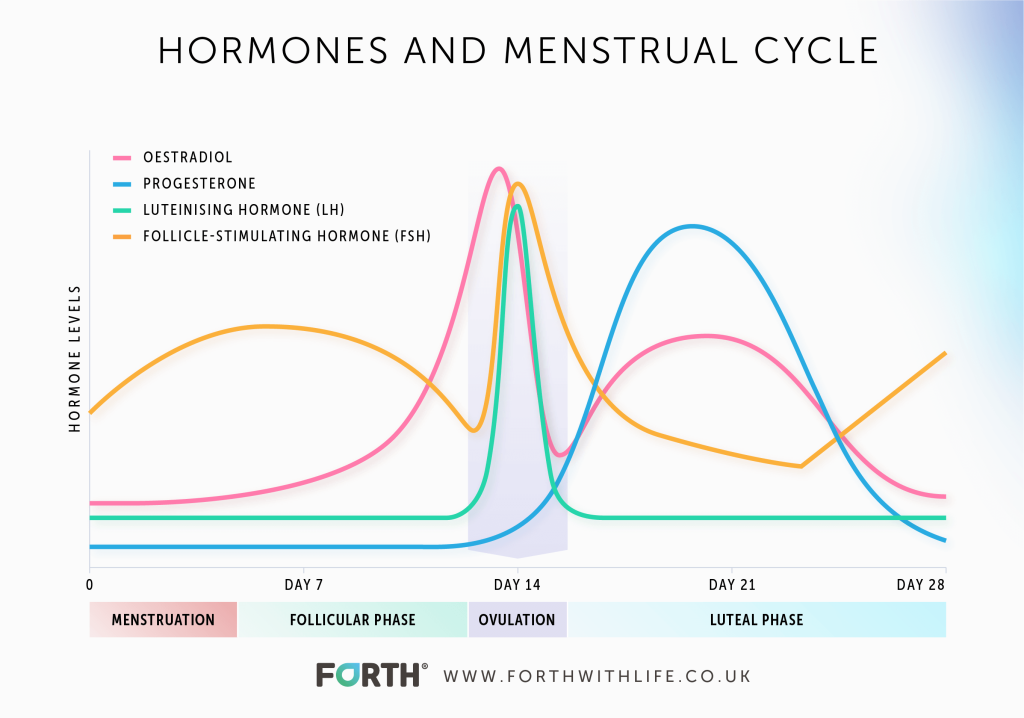6 mins read
Why Oestrogen is the True Power Hormone

- What is Oestrogen?
- Oestrogen’s Impact on Women’s Health
- Oestrogen And Immune Health
- Oestrogen And Brain Function
Recent studies are beginning to emerge showing that oestrogen plays a role in preventing severe illness from covid-19. The studies have shown that post-menopausal women are more likely to become severely ill and die from covid-19 than women under 50, with mortality rates increasing sharply in women over fifty. However, women on HRT were 78% less likely to die from covid-19.
The protective role of oestrogen in women doesn’t just stop at preventing severe illness from respiratory diseases – it plays an important role in other biological functions too.
So how does this ‘power’ hormone affect women’s health?
What is Oestrogen?
Oestrogen is sex steroid hormone produced in the ovaries and has three forms in women:
- Oestradiol
- Oestrone
- Oestriol
Oestradiol is the strongest of the three oestrogen hormones and is the main form of oestrogen in women. Its main role is to mature and maintain the female reproductive system, but it also has many other functions within the body.
Oestrogen’s Impact on Women’s Health
Oestrogen is responsible for puberty and is one of the 4 main hormones involved in the menstrual cycle.
Naturally fluctuating oestrogen levels during the menstrual cycle have an impact on women’s health, from changes in mood, digestion, appetite, and energy levels.

It is also responsible for the symptoms women experience during the perimenopause as women’s ovaries become less responsive and oestrogen levels decline.
This is because there are oestrogen receptors throughout the body, from the brain to the stomach. As a result, oestrogen plays a much wider role in the regulation of a number of physiological and psychological functions, including:
- Bone density
- Brain function
- Maintaining healthy skin & hair
- Cholesterol levels
- Cardiovascular system
- Central nervous system
- Immune system

How Does Oestrogen Affect The Cardiovascular System?
Diseases such as angina and heart attacks present 10 years later in women compared to men due to women having higher oestrogen levels. Although women of reproductive age still have heart attacks there are lower incidences of cardiovascular disease in this group of women [1].
The reason for this is thought to be due to the positive effect oestrogen has on the inner layer of the artery wall which helps to keep blood vessels flexible. It also regulates cholesterol levels.
As oestrogen levels decline in women going through perimenopause and post-menopausal women, their heart disease risk increases as levels of LDL cholesterol increase and levels of HDL cholesterol decline due to lower levels of oestrogen.
Oestrogen And Immune Health
Studies in the 1940s found that women have a stronger immune response than men, due to their enhanced capability of producing antibodies. This means they are better at fighting off viral infections, but it also means that women are more susceptible to developing autoimmune diseases as a result of their strong immune response [2].
Oestrogen has an immunoenhancing effect on the immune system and has been shown to regulate immune response [2]. This is because there are oestrogen receptors on the cells that fight infections and oestrogen improves the number of these cells in the body, as well as their genetic programming and lifespan [3]. Given women have higher oestrogen levels than men, would explain why women have a stronger immune system.
A recent study into covid-19 in women found that women using HRT who developed COVID-19 were less likely to die from the disease. Further studies have shown that women aged between 18-45 taking the combined oral contraceptive pill were also at a lower risk of COVID-19 infection [4], suggesting that oestrogen could be a real powerhouse when it comes to preventing infections such as covid-19, Hepatitis C, Ebola and HIV [3].
Oestrogen And Brain Function
As mentioned above, oestrogen plays a key role in brain function by affecting the development and ageing of regions in the brain that are associated with a higher cognitive function such as memory. Studies have shown greater changes in brain structure, function and metabolism between males and females as they age [5].
These higher cognitive functions are also linked to disorders such as Alzheimer’s disease [6]. Alzheimer’s disease is 2 to 3 times more common in women than in men and cognitive decline is often accelerated in women after menopause – which could also explain why one of the symptoms of perimenopause is memory loss and ‘brain fog’.
More research is being carried out into the role oestrogen plays on brain function and whether or not women should be prescribed oestrogen and progesterone combined HRT to treat various neuropsychiatric disorders [6].
Oestrogen Levels
Oestrogen levels fluctuate during a woman’s menstrual cycle peaking at ovulation. They also decline as a woman enters her early 40s and her ovaries become less responsive due to the onset of perimenopause.
Low oestrogen levels due to menopause cause a variety of symptoms including:
- Irregular periods
- Hot flushes & night sweats
- Trouble sleeping
- Vaginal dryness
- Reduced sex drive (low libido)
- Mood swings
Learn more about symptoms of perimenopause.
These symptoms can also occur in women who have had a hysterectomy and have ovaries.
High oestrogen levels in women can result in [7]:
- Weight gain, mainly in your waist, hips, and thighs
- Menstrual problems, such as heavy bleeding
- Worsening of premenstrual syndrome
- Fibrocystic breasts (non-cancerous breast lumps)
- Fibroids (noncancerous tumours) in the uterus
- Fatigue
- Loss of sex drive
- Feeling depressed or anxious
High oestrogen levels can be found in conditions such as PCOS where there are timing and coordination issues with ovarian hormones.
Conclusion
Oestrogen plays a crucial role in women’s health, protecting them against diseases such as heart disease and now respiratory diseases such as covid-19.
Its effects on the body are far-reaching with receptors throughout the body that impacts a woman’s overall wellbeing. This explains why some women experience monthly PMS and why women can experience a raft of symptoms during perimenopause.
Tuning in to your hormones and how they impact your health will help you now and in the future. Adopting a healthy lifestyle now and continuing with it as you get older will help support your hormone health.
Understanding how your hormones fluctuate across an entire menstrual cycle and if they are fluctuating as expected is the first step to proactively managing your hormone health.
- Health scores calculated
Close
Article references
-
Dambha-Miller, H et al. (2021). Mortality in COVID-19 Amongst Women on Hormone Replacement Therapy or Combined Oral Contraception: A Cohort Study.
This information has been medically written by Dr Thom Phillips
Thom works in NHS general practice and has a decade of experience working in both male and female elite sport. He has a background in exercise physiology and has published research into fatigue biomarkers.

Dr Thom Phillips
Head of Clinical Services
Related articles
Like this article? Here are some more based on similar topics.





